UNICA – IAU joint webinar: Higher Education Leadership Practices and Leaders for a Sustainable Future, 8 June 2021
11 June 2021 | From UNICA
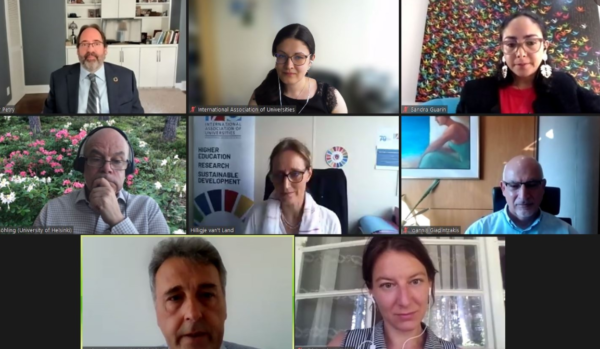
On 8 June 2021, the UNICA network in collaboration with IAU, the International Association of Universities, hosted a webinar titled “Higher Education Leadership Practices and Leaders for a Sustainable Future”.
The two associations share the same vision about sustainable development and are engaged in the promotion of the good practices and experiences adopted by their member universities, within and outside their networks.
With the excellent moderation of Hilligje van’t Land, Secretary General of IAU, the speakers shared with the audience their successful experiences and the challenges encountered while adopting a whole sustainable university approach.
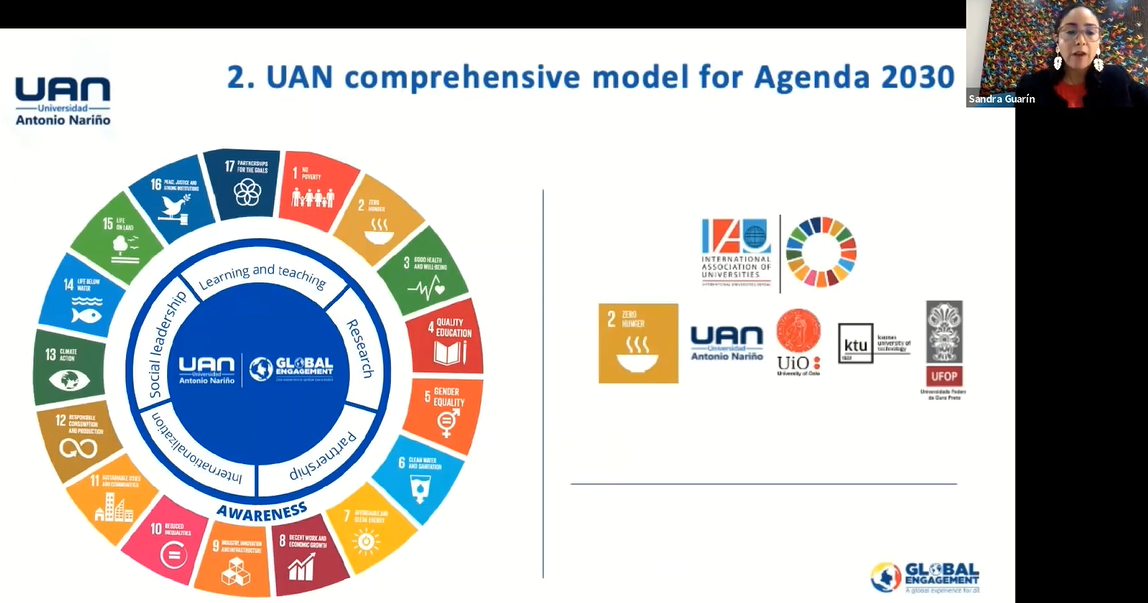
The first speaker was Sandra Guarin, Director of International Relations of the Antonio Nariño University (UAN, Colombia), who analysed the sustainable actions adopted by her university from the point of view of the international offices. Sandra shared her positive vision about “online” mobility, which is complementary to “traditional mobility” and has a positive environmental effect. Sandra also underlined the importance of international collaboration to implement the SDGs at universities. Collaboration is beneficial not only among institutions, but also with other members of the civil society. In this regard, she underlined, for example, the partnership between UAN and several NGOs regarding migration and integration of refugees in the society.

The inspiring experience of the UAN was followed by the presentation of Tom Böhling, Vice-Rector of the University of Helsinki (Finland). The professor stressed the importance of collaboration, by giving the example of UNIFI, a network of all Finnish universities. UNIFI is currently working on 12 theses destined to higher education institutions to reflect on and debate about the SDGs. Tom also shared the slogan of the University of Helsinki, “Sustainability starts with me – with all of us!”, which shows the importance of individual commitment as well as the role of collaboration among the members of the university (students, staff, professors and leaders).
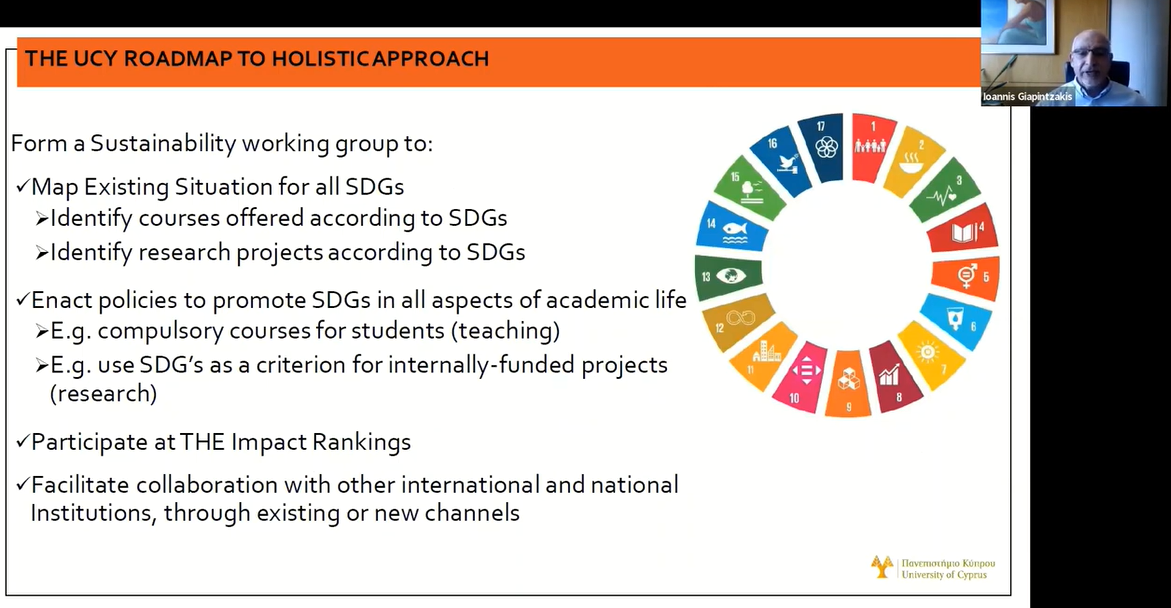
As Ioannis Giapintzakis, Vice-Rector for International Relations at the University of Cyprus, underlined, the government of his country is less active in the field of sustainability. As a result, UCY wants to play a role model in Cyprus and provide an inspiring example to the world. Despite the young age of the university, they are adopting a whole institution approach regarding sustainability, thus they are engaging in several international projects related to the SDGs (such as the SAVES and the SAVES 2, where UNICA was a partner as well) and carried out investment projects to make the university greener.
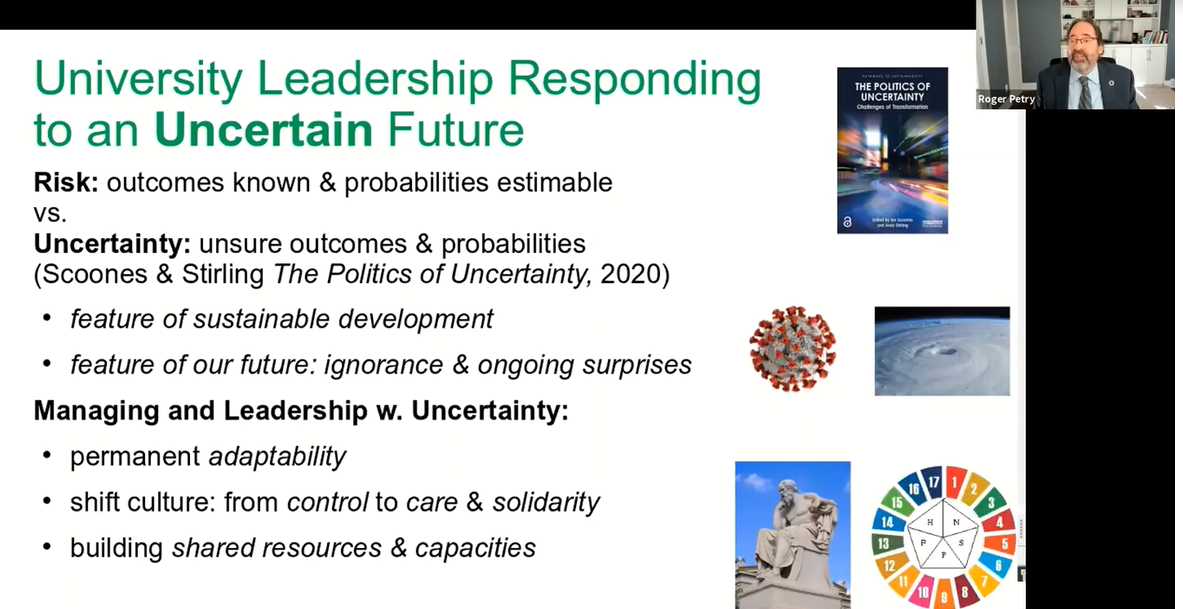
Of course, these actions are all planned in the long-term and most of the time outcomes cannot be foreseen precisely. The concept of uncertainty was analysed by Roger Petry, Professor of Philosophy at Luther College & Co-coordinator of RCE Saskatchewan (Canada). The uncertainty is strictly related to the adoption of the SDGs, that’s why permanent adaptability is demanded of universities and a shifting culture from control to care and solidarity. Professor Roger pointed out that in order to aspire to a successful strategy, universities have to try new things, start small, keep listening, use the SDGs for questioning, mobilising, fund SDGs, be flexible and adopt a whole university approach!
During the final discussion, the speakers stressed on the importance of being flexible: universities have to be flexible in order to respond to a generation which changes so rapidly. To reply to these changes collaboration is needed both within the university and internationally. In this regard, universities have to be prepared to face challenges, for example stemming from governments being reluctant or hesitant to adopt a sustainable approach. Universities need to show courage and be radical. Challenges can also be present within the universities, every internal office has to understand that SDGs have to be adopted at all levels.
In a nutshell, universities need to collaborate, share good practices and the ways to face the obstacles which can be encountered. The entire institution has to become involved in sustainable development and, in this regard, be flexible to embrace changes.
In case you missed the webinar, the recordings are already available on YouTube.

 Co-funded by the European Union. Views and opinions expressed are however those of the authors only and do not necessarily reflect those of the European Union or the European Education and Culture Executive Agency (EACEA). Neither the European Union nor the granting authority can be held responsible for them.
Co-funded by the European Union. Views and opinions expressed are however those of the authors only and do not necessarily reflect those of the European Union or the European Education and Culture Executive Agency (EACEA). Neither the European Union nor the granting authority can be held responsible for them.